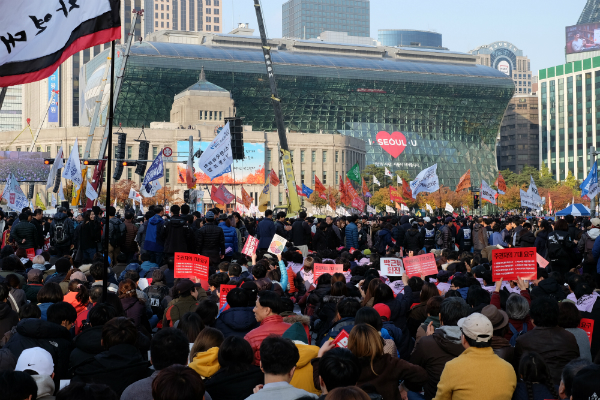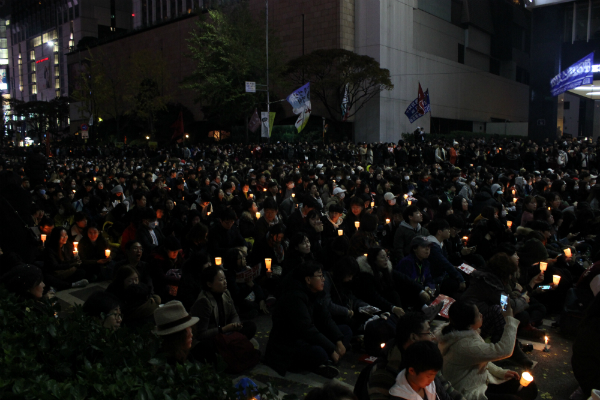Nationwide outrage: the Choi Soon-sil Gate
 | ||
| CONTRIBUTED BY KIM BEOM-SOO | ||
THE NATION was shaken at its core by shocking news first reported by the broadcasting station, JTBC, on Oct. 24. JTBC disclosed the contents of a discarded tablet PC belonging to Choi Soon-sil, a close confidant of President Park Geun-hye, revealing that Choi had been involved in critical political scenes for the past several years. The tablet PC’s contents showed that, despite being an unelected and unauthorized individual, Choi had possessed and even edited highly confidential government content, including 44 presidential speeches. Further accusations were made that Choi had taken advantage of her friendship with President Park for personal gains, receiving large sums of money for her own foundations and securing her daughter’s entrance to Ewha Womans University. This revelation sparked nationwide skepticism and outrage toward the government, with South Koreans questioning the democratic foundation of the nation and the competency of the current leader. It has been a confusing and chaotic past month, with South Korean people demanding clarification of the truth.
The government’s response
Not only the scandal itself but the government’s response to it triggered anger in many people. Citizens heavily criticized and revealed their distrust in the prosecution’s half-hearted way of dealing with the matter of Choi Soon-sil. Even though speed was of utmost importance in investigation of this scandal, the prosecution seemed to dawdle and only began its search a day after Choi returned to Korea from Germany on Oct. 30. When the prosecution raided Choi’s foundations—Mir and K-Sports Foundations—for evidence of corruption, the companies had already replaced their computers and gotten rid of important documents, not leaving much for examination. In addition, Cheongwadae, or the Blue House, refused the prosecution’s search and seizure request in an attempt to protect the president, which provoked further outrage from citizens.
On Nov. 20, the prosecution announced an intermediary report regarding the investigation results of Choi and other central figures related to the Choi Soon-sil scandal. Lee Young-ryul, the director of the Special Investigation Bureau, stated that judging from evidences collected until now, the prosecution had identified President Park as an accomplice. The prosecution charged the president with assisting Mir and K-Sports Foundations’ compulsory fundraising, allowing a civilian (Choi) to intervene in state affairs and leaking confidential documents. However, according to Article 84 in the Constitution, the president cannot be prosecuted while in office. Regarding this point, Lee declared that the prosecution will continue its investigation on matters related to the president and the Choi Soon-sil affair.
On the other hand, Park and Cheongwadae denied any and all suspicions without providing sufficient explanation, attacking those who have raised such doubts. Yu Young-ha, the president’s lawyer, expressed his skepticism regarding the prosecution’s announcement on Nov. 20, proclaiming that the prosecution does not have a neutral stance. Yu said that the president will not accede to any of the prosecution’s investigation requests from now on and that she will only answer to the Special Prosecution Bureau. At the same time, Cheongwadae, on its official homepage, dismissed the reports of the press until now as “false myths.”
The Choi Soon-sil Gate bred disruption among the parties as well. The ruling party (yeo-dang) has experienced an interior split between Pro-Park and Anti-Park Alliances. The pro alliance argued for a government of national unity while retaining a firm position that Park will not resign her post. On the other hand, the Anti-Park alliance called for either an impeachment or resignation of President Park. The opposition parties (ya-dang) also demanded for Park’s impeachment or resignation.
 | ||
| PHOTOGRAPHED BY KIM YU-JIN | ||
Voicing out anger
Frustrated with the inadequate measures of the government, citizens have taken it upon themselves to demand the president’s resignation. Starting from Oct. 29, massive candlelight rallies voicing fury toward the current government took place near Gwanghwamun on Saturday, recording approximately a million gatherers on Nov. 12.
South Korean university students both in and outside the country demanded the resignation of Park. Since Oct. 26, when the first denunciation from the student body was made by Ewha Womans University, more than 100 universities followed suit. While student representatives of each university emphasized different points in their official declarations, the gist of their demands was the resignation of President Park and a transparent investigation on the current state. Professors of several universities made official declarations denouncing the scandal as well. South Korean students studying abroad, including those in the United States, Singapore, Hong Kong, Sydney, and Beijing also demanded the resignation of Park. They all declared that the president has demeaned the nation, and as international students, they couldn’t suppress their anger at what’s happening in their home country.
University students also hosted events outside campus in calling for Park’s resignation. Students from universities nationwide held a rally starting from Marronnier Park on Nov. 12; on Nov. 15, students from about a dozen universities hosted masked demonstrations occuring all at once in different parts of Seoul.
Reactions outside the country
The scandal provoked keen interest in foreigners as well. An exchange student at Yonsei from the United States, Christian Na (Soph., College of Communication) explained, “I think the biggest problem is the dishonesty and lack of transparency on the part of President Park, and how it has upset so many Korean citizens.”
Several major newspapers and broadcasting stations around the world have even done in-depth coverage of the issue. Especially after the massive protest on Nov. 12, many major foreign presses have covered this scandal. CNN reported on Nov. 12: “The classified information scandal, while rare and shocking in South Korea, isn’t the only reason many are calling for her to step down. There has been growing frustration with Park over the past few years stemming from a number of incidents, including the Sewell ferry sinking which killed more than 300 people.” The article not only covered the current issue but also drew connections with events from the past to better demonstrate the seriousness of this scandal.
Moreover, The New York Times reported on Nov. 12 that “Ms. Park has become the least popular South Korean leader since the late 1980s, according to recent polls. Her secretive adviser, Choi Soon-sil, has been arrested on charges of leveraging her ties to the president to bully businesses into donating $69 million to two foundations she controlled. Ms. Choi is a daughter of a cult leader who became Ms. Park’s mentor in the 1970s, when Ms. Park’s father was still in power.” Also, The New York Times used the term “dictator” when referring to Park’s father, being more straightforward and outspoken than most South Korean press.
Regarding the massive protest on Nov. 12 in South Korea, foreign press viewed them quite positively. The Washington Post reported, “South Koreans from across the country and across generations peacefully took to the streets of the capital Saturday night, calling through songs, shouts and placards for the immediate resignation of their scandal-plagued president, Park Geun-hye.” Moreover, according to the report, “With as many as 1 million people on the streets of Seoul, it was South Korea’s largest demonstration in more than a decade … and it increased the pressure on Park over widening corruption and influence-peddling controversy.”
* * *
In the documentary, Geu geot i al go sip da (I Want to Know That) aired on Nov. 19, three things were pointed out as unchanging factors in South Korean society: the press, chaebol (family-owned conglomerates which dominate the nation’s economy), and the prosecution. Indeed, the series of doubts left unresolved are proof that South Korea may be a society where truth is not easily found, and power lies in the hands of the few and privileged. This political scandal could be a rare opportunity to reveal the nation’s corruption and enable change; but if poorly resolved, the nation’s hard-earned democracy would surely turn hopeless.
Editors
annals@yonsei.ac.kr

